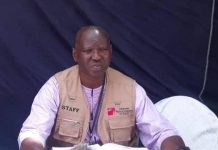By: Kebba AF Touray
Members of the Finance and Public Accounts Committee (FPAC) of the National Assembly on Monday 29 January 2024 adopted the 2021 activity report and financial statements of the Gambia Revenue Authority (GRA) with amendments.
The adoption came following an intensive scrutiny and consideration of the said GRA report, marked by question and answer session between the officials of the authority and the committee.
During the enquiries, members of the Committee quizzed officials of the authority on the types of levy on entities, the use of over D12 million to build the office for the authority and the need for the authority to present its budget to the committee in their future engagements.
On other revenue sources, the committee asked for clarity on the use of D12,128,000 of which D6,823,000 was commission received as GSM levy.
“Is there any other levy being collected for third parties and do you receive any directive for collecting these levies?’’ members asked, with the officials of the GRA responding that they have GSM and environmental tax levies among other levies and that 5 percent on these fees have been levied because they have received directives to collect these fees.
On GRA to avail its budget to the committee, officials of the authority replied in the positive saying the budget is readily available and that they will provide it to the committee for their perusal.
On overseas training, the committee asked for the authority to explain the impact of such training as the amount of over D12 million is huge.The officials of GRA explained that though the figure is high, the training is very significant for the revenue authority.
“We have evolved in modernization and more of this is to do with digitization. We also conducted a lot of professional training outside the country including on ICT and ACCA including a Masters Degree. One of the key things that we do at GRA is capacity building, and that is something we have given high priority,” explained GRA officials.
They said looking at the evolution of the authority, capacity building is number one without which, the purpose of putting those systems might be defeated.
“The reason for doing what we are doing in terms of executing an excellent collection in terms of the taxes levied on us or the responsibility given to us is because we have the capacity in-house. As a management, we ensure that we maintain that to an extent that we can now allow other institutions to have our staff on secondment basis,” the GRA Officials told Members of the Commission.
According to the officials, almost 40 percent of their staff are well-trained, because most of them are high school graduates, as such the authority invest a lot in capacity building, which corresponds to the vision of the authority which is the digitization of the GRA.
“The vision is to digitize all revenue collection by GRA, and to improve on all the loopholes and to strengthening administrative efficiency. All this needs training of our staff and to change their mind set by utilizing their training in order for them to improve on their work,” officials of the authority said, adding that as a Board, they are very particular about making sure that the organization’s vision is attained and willnot hesitation to approve and allocate funds towards this.
“The number of graduates within the entities of the authority was very minimal, but the authority has over 200 graduates with over 50 to 60 of them Masters Degree holders, with 12 to 15 holders of ACCA, and 6 to 7 staff who have qualified as lawyers, including series of IT experts among other qualifications.This is something we want to maintain as an institution because we believe that is the way forward,” officials of the authorities told Members of the Commission.
The officials further explained that they belong to significant sub-regional and international organizations like the West African Tax Administration Forum (WATAF) and the World Customs Organization (WCO) where GRA has statutory membership.They said one of the key benefits they have derived from these key organizations, is capacity building, adding that the kind of work they do is based on specialization and as such, some of the capacity building programmes are specialized or tailor made for staff of GRA. Officials said the authority benefits enormously from these types of capacity building training particularly on tax and revenue administration.
After a lengthy interface between the GRA and FPAC, the Commissioner General outlined some of the challenges confronting the authority in its tax and revenue collection mandate which potentially affects overall collection. He said one of the major challenges is the inadequate subvention they are getting to establish offices and accommodation for their staff across the country, which he said is costing them a lot of money.
“As such, most of our work is at a standstill. That is one of the main challenges we have in terms of operational issues confronting the GRA. If we can only get our subvention as calculated, it will be very easy for us to accomplish whatever vision and mission that we have,” he said.
He said they need to purchase vehicles and riders for operational purposes because most of the borders are porous, and there is need to have the required number of vehicles in order to conduct the required patrol along those borders. This, he said, will ensure that people donot smuggle anything into the Gambia. He also outlined other challenges faced by the GRA in the areas of capacity building, the maintenance of software to avert being cut-off by people who developed the software, and the license fees they have to pay to the developers of the software.
“We need to have our subvention so that we can do whatever we want to do. Our main constraint in terms of operationalization is to have our subvention on time and to have it in full,”CG Darboe reiterated.
After a day-long intensive scrutiny and consideration of the GRA reports, members of FPAC unanimously adopted the 2021 reports of the country’s Revenue Authority, but with amendments.




















